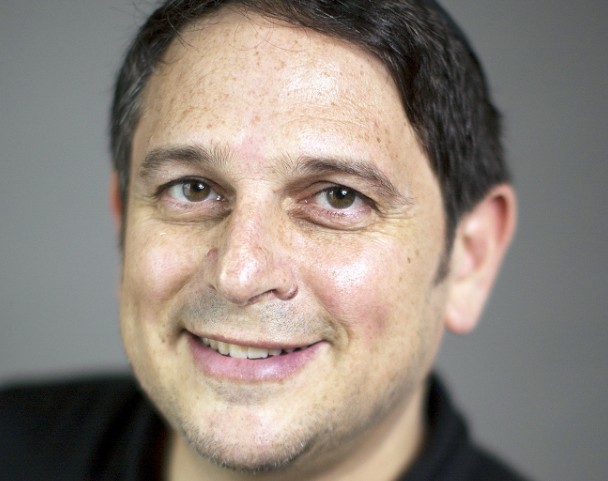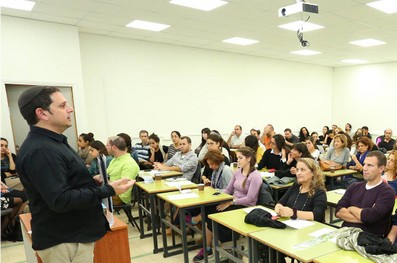Coach Aaron Darmon: "The Process Has the Taste of Sweet Fruit, and You Need to Learn to Enjoy It as Well"
Aaron Darmon has traveled a long road to reach his purpose. Today, he sees himself as an 'expert in change strategy,' helping thousands of people step out of their comfort zones towards significant life transformations. What led him to overturn his life's course and become a therapist, what are his thoughts on lengthy and arduous processes, and how does he manage to balance so many roles in his life?
 Aaron Darmon against the backdrop of the synagogue he established
Aaron Darmon against the backdrop of the synagogue he establishedAccording to simple logic and without the divine guidance that accompanied him hand in hand straight into the embrace of Judaism, author and coach Aaron Darmon claims he would "probably be married to a non-Jew, like many Jews in France who, unfortunately, assimilated."
Yet thanks to that guidance, his worldview began to change at the age of 13. "The need to search was there my whole life, and from then I drew closer to myself and to Hashem, and made substantial internal changes to my way of thinking."
During that period, the city of Cannes, where he was born, was a tourism hotspot full of desires, and against this backdrop, the desire to find depth began to sprout in him. "I was looking for something interesting, and somehow I stumbled upon a Tanya book, which, among other things, led me to start wearing a yarmulke a year later."
However, this step was met negatively at the non-Jewish school he attended, and the school administration decided to suspend him because of it.
Around the same time, sanctions were imposed against a young Muslim woman who wore a hijab on school grounds, as school rules prohibited it. "I was punished not due to antisemitism, but more because I broke the law," explains the 46-year-old Darmon, married to Clara and father of seven. Among his various hats as an architect and a therapist using different Jewish psychological methods, he is currently writing a book on the weekly Torah portions, intending to incorporate diverse psychological insights.
"I couldn't find a place that truly expressed what I felt"
When Darmon's mother passed away when he was 19, he made one of the most crucial decisions of his life: to leave France and immigrate to Israel. Here, a few years later, he met his wife, and the couple strengthened their spirituality together.
Simultaneously with the increasingly rapid process of repentance, Darmon tried to belong to different streams in the Jewish world: Lithuanian, Sephardic, and Hassidic. "Still, I couldn't find a place that truly expressed what I felt inside, and all that time, I was outside the religious sociological definitions," he explains.
All this continued until about a decade ago, when he decided to open the synagogue he had envisioned for years. "It's a synagogue located on Kurzin Street in the Nachlaot neighborhood of Jerusalem, combining both Sephardic and Ashkenazic prayer styles."

"This means we combine Jerusalem melodies and Moroccan tunes. It's a synagogue that gathers and embraces everyone, open to different prayer styles: Carlebach, Hassidic, Ashkenazic, and Sephardic."
Over the years, the synagogue in Nachlaot has become a magnet for dozens of worshippers from all across the Israeli spectrum. Today, among the many Torah classes held there, you can also find Darmon's fascinating lessons on Jewish psychology and soul wisdom.
In Israel, Darmon completed his architecture studies at Bezalel, but years later, realizing the connections with computers were becoming too tight, he decided to shift careers to Jewish psychology in order to strengthen precisely interpersonal and personal connections. "I really wanted to understand people and help them solve various tangled issues they encounter in life," he explains. "I decided to learn dozens of methods, ranging from guided imagery and spontaneous imagery to Jewish coaching."
Much water has flowed under the bridge since then. Darmon has gained not only relevant education in his field but also 15 years of experience, leading to the unique coaching course he offers called 'Good and Doing Good.'
"The process has the taste of a fruit, and you can enjoy that taste if you're willing to go through it"
Thanks to the path he has traveled and the experience he has gained, Darmon now defines himself as an 'expert in techniques and strategies for creating change.'
What does that mean, and can any ordinary person suddenly change their belief systems and perceptions just with a few new insights?
"The method I developed helps a person identify mechanisms of stagnation in the deeper layers of the soul. Often, our problems are not necessarily connected to the specific issue but to a deeper layer that we might never have addressed. When you delve into the past through the power of imagination, there's the potential to change the values that imagination itself created for us. For example, a 30-year-old single man who expects too much from women might discover that all this desire stems from one time when his mother was late picking him up from kindergarten, and he feared she might never come. That mother was only fifteen minutes late, but the experience taught the young boy a lesson—either he became overly dependent to the point of suffocation, or overly independent, not truly wanting to let someone else into his life bubble."
Yes, but most of us, nonetheless, find it hard to achieve a fundamental change in our lives.
"True, but that's because we are used to living in psychological and practical comfort zones, even knowing that what they offer us is not satisfactory, we prefer them over the renewal that stirs fears of the unknown. It happens to all of us. We're afraid to discover new things and change habits because our brain is wired so that when we do something several times, the neural path in the brain becomes a sort of highway."

"The more we repeat deeds, emotions, and thoughts, the more this becomes our preferred path, because the habit is performed without the need for thought, whereas change requires work on awareness. Change often demands slow processes of introspection and making decisions that frighten us because they require us to take responsibility."
Speaking of slow processes, some people might be paralyzed by the very knowledge of this, preventing them from seeking therapy.
"Correct, but you need to understand that despite the fear, our whole life is a journey, and these processes are a journey that can be the most fascinating there is. If you want to see results, you have to change paradigms and invest, and continue to invest even when the results are not immediate.
"As a therapist, I encounter this phenomenon a lot, where a person starts a certain path, makes a small effort. And when they see the results are late in coming, they excuse it with the thought that it's not working because Hashem doesn't want it from them. That's simply not true. Don't say it's not working; say I lack the patience to wait until it works. As believers, we often, and perhaps too often, tend to throw all responsibility onto Hashem, because it's easiest for us. 40% of singles, for instance, say their status is a heavenly decree, but to me, this 'problem' is no different from any other. Many singles entrench themselves in their comfort zones and don't really do everything to get out of them.
"There are no magic solutions of 'here' and 'now.' Someone who wants to achieve something in life needs to work hard for it, and this is true of all areas of our lives. The 'peace now' approach is inherently non-Jewish and has nothing to do with Judaism. Judaism advocates a completely different approach, a procedural one. There's no 'Messiah now'; salvation takes time. When you start understanding what a process is and enjoy it, amazing things will happen in your life. Don't try to reach the fruit all the time because the Torah already teaches us that 'a fruit tree makes fruit.' The tree itself, in all its parts, also has the taste of the fruit. People are looking for the change itself, but Hashem says that the process has the taste of fruit, and you can enjoy that taste if you're only willing to go through it."

